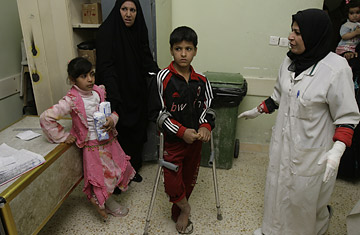
An Iraqi boy waits for treatment in a hospital in Sadr City, in Baghdad, Iraq, February 16, 2008.
In the conflict zones of Darfur, Somalia and the eastern Congo the fluttering flags and wide signs of UNICEF, Doctors Without Borders, CARE International, World Vision, Save the Children, Oxfam and many others announce their presence on cars, offices and projects. But no such flags fly in Baghdad. Not one of these groups has a presence there. Even as levels of violence have gone down — January was the safest month in Baghdad in two years — aid agencies have still been extremely slow to return to the Iraqi capital.
Agron Ferati, country director for the International Medical Corps (IMC), one of a few international NGOs in Baghdad, says that since November 2007 the IMC has been calling for a "humanitarian surge," not only in financial resources but also for other NGOs to set up shop in Iraq rather than work remotely in neighboring Jordan. It is necessary, he says, "if we want this current security leading to tangible sustainability." His point was echoed during the recent visit by Angelina Jolie, a U.N. goodwill ambassador, when she expressed concern for the millions of Iraqis affected by the war and stated a need for "a real presence here to help count the people and register the people" displaced by the conflict.
Two million Iraqis have fled their country and are living, for the most part, in neighboring Syria and Jordan; about another 2.4 million have left their homes for other areas within Iraq. According to the International Organization for Migration only 22% of internally displaced people in Iraq have regular access to the government food distribution, which is "broken, at best," says the IOM's Dana Graber Ladek, a displacement specialist in Amman. "Security has improved in Baghdad and Anbar, but is the humanitarian crisis over? No."
"The task here is really monumental," says Dr. Said Hakki, an American of Iraqi descent who is now president of the Iraqi Red Crescent Organization. Basic services, such as ambulance dispatches, are almost nonexistent. "The response time in America is about seven minutes. In Saudi Arabia it's nine to ten minutes and in the region it's 12-15 minutes." By comparison, says Dr. Hakki, "the response time in Iraq is two hours to infinity."
Despite the relative respite from violence, a host of problems confront aid agencies coming to Iraq. In addition to security concerns, they face the mounting problem of donor fatigue and resistance from countries that don't want to be affiliated with an American-led reconstruction effort.
Aid groups are also hard-pressed to come to a country where a large percentage of budgets must go to protecting foreigners. It is also of deep concern that humanitarian projects cannot be easily monitored because of a lack of security. For the handful of foreign NGOs currently in Baghdad the situation is frustrating, they say, because of the lack of direct contact with their Iraqi beneficiaries. "You are dependent on secondhand information — you could be in Amman or Washington or Paris," says Guy Siri, who says he can count the number of international aid agencies in Baghdad on one hand.
These security concerns — real and perceived — are the chief obstacle to the NGOs coming back. "We are still dealing with the fallout of 2003," says Guy Siri, a humanitarian coordinator with the U.N.'s mission in Iraq, referring to the bombing of the U.N. headquarters that claimed 22 lives, including the U.N. Secretary General's special representative to Iraq, Sergio Vieira de Mello. The following month, the U.N. withdrew from Iraq, returning only in August of 2004 in very small numbers.
The current U.N. mission in Baghdad is tiny. Their cramped offices are located at the end of a series of concrete and razor-wire-lined streets in the Green Zone, accessed through Fijian, Peruvian and Ugandan checkpoints. Meanwhile, UNICEF, the U.N.'s children's aid organization, is the most conspicuously absent. Others, such as the World Health Organization, UNHCR (the U.N.'s refugee agency) and the U.N. Development Programme have between zero and three people in Baghdad at any given time. The security alert for the office is at level four, one stage before evacuation.
A representative from the intrepid international medical organization Doctors Without Borders (which goes by its French acronym MSF), which operates in such dangerous and far-flung places as the Central African Republic, Somalia and Darfur, says, "the security is not allowing us to go to Baghdad." MSF was operational in Iraq in 2003 from April to Nov 2004 when it closed its projects and withdrew their staff. "It became increasingly dangerous to be even associated with a humanitarian organization," he says. Today MSF has an office in the northern Kurdish region of Iraq, where it is considerably safer but also far removed from the treacherous areas to its south.
Ferati argues that the U.S. military surge may improve security, but that if there is no parallel surge in humanitarian efforts to improve the lives of the vast majority of ordinary Iraqis, all will be for naught. "If we want to see the current improvement in security for long term, we need to immediately increase access services to Iraqi citizens," says Ferati. "They need to see a tangible difference — they need something they are willing to fight for — clinics, schools, jobs. The military is not and should not be there to develop the community. There should be an NGO surge to take up community development and empower communities so that they can lead the changes at the grassroots level and also help the ministries improve and help [implement] the changes." But so far, most aid agencies are too frightened to help.
